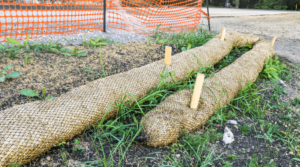
cropped farm dictionary logo.jpg
Watershed Management
Definition:
Watershed management is a holistic approach to managing the entire area that drains into a particular water body, such as a river, lake, or reservoir. It involves coordinating land and water resources to protect and improve water quality, manage floods and droughts, conserve natural habitats, and sustainably utilize water resources for various purposes, including agriculture, industry, and recreation.
Practical Advice:
- Understanding Watershed Dynamics: Gain a thorough understanding of the natural processes and human activities within the watershed, including land use, hydrology, ecology, and socio-economic factors. Analyze the interconnectedness of these elements to identify opportunities and challenges for watershed management.
- Collaborative Governance: Foster collaboration among stakeholders, including government agencies, local communities, landowners, and non-governmental organizations, to develop and implement watershed management plans. Engage stakeholders in decision-making processes, prioritize shared goals, and leverage collective resources and expertise for effective watershed management.
Valuable Assistance:
- Land Use Planning: Implement land use planning strategies that promote sustainable land management practices within the watershed. Encourage responsible land development, zoning regulations, and conservation easements to minimize soil erosion, protect riparian areas, and preserve natural habitats critical for watershed health.
- Water Quality Monitoring: Establish water quality monitoring programs to assess the health of water bodies within the watershed and identify sources of pollution. Monitor parameters such as nutrient levels, sedimentation, chemical contaminants, and biological indicators to track trends, prioritize restoration efforts, and inform management decisions.
Enlightening Details:
- Green Infrastructure: Promote the use of green infrastructure, such as vegetated buffers, wetlands, and riparian corridors, to enhance water quality and mitigate flooding within the watershed. Green infrastructure features help filter pollutants, absorb excess nutrients, and reduce stormwater runoff, improving overall watershed resilience and ecological integrity.
- Floodplain Management: Implement floodplain management strategies to reduce flood risks and protect communities and infrastructure within the watershed. Adopt floodplain zoning regulations, floodplain mapping, and flood mitigation measures such as levees, berms, and stormwater retention ponds to minimize flood damage and safeguard lives and property.
Actionable Suggestions:
- Public Education and Outreach: Conduct public education and outreach campaigns to raise awareness about watershed issues, promote stewardship practices, and engage citizens in conservation efforts. Provide resources, workshops, and volunteer opportunities to empower individuals and communities to take active roles in watershed management.
- Adaptive Management: Embrace adaptive management principles to continually assess and adjust watershed management strategies in response to changing conditions, new information, and emerging threats. Monitor outcomes, evaluate effectiveness, and adapt management actions based on feedback and lessons learned to achieve long-term sustainability goals.
Conclusion:
Watershed management is essential for safeguarding water resources, protecting ecosystems, and supporting sustainable development within a watershed. By adopting integrated approaches, fostering collaboration, and implementing science-based practices, stakeholders can effectively address complex watershed challenges and promote the health and resilience of aquatic ecosystems and human communities alike.
Fall off the barn roof and busted your keister? Life on the farm or ranch can be tough on the bum. Need a break? Laugh it off at FarmerCowboy.com, the #1 farm humor site. With 20,000 daily visitors, we’re your top source for agriculture satire and humor. Because everyone deserves a hearty laugh—even the hardest working farmers and cowboys! Join us and turn those long days into fun tales at FarmerCowboy.com.
Originally posted 2005-07-16 07:12:07.
Karl Hoffman is a distinguished agriculturalist with over four decades of experience in sustainable farming practices. He holds a Ph.D. in Agronomy from Cornell University and has made significant contributions as a professor at Iowa State University. Hoffman’s groundbreaking research on integrated pest management and soil health has revolutionized modern agriculture. As a respected farm journalist, his column “Field Notes with Karl Hoffman” and his blog “The Modern Farmer” provide insightful, practical advice to a global audience. Hoffman’s work with the USDA and the United Nations FAO has enhanced food security worldwide. His awards include the USDA’s Distinguished Service Award and the World Food Prize, reflecting his profound impact on agriculture and sustainability.






